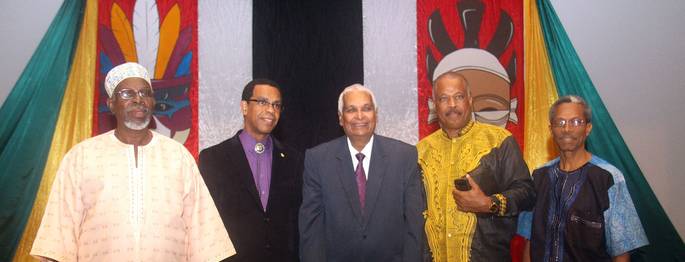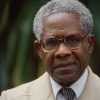
(Left to right) Aiyegro Ome, chair of the TTNCR; Rodger Samuel, Minister of National Diversity & Social Integration; Winston Dookeran, Foreign Minister; Prof. Hilary Beckles.
The University of the West Indies, Vice-Chancellery. Tuesday, June 30, 2015 – “We now need to say to the British Government development is a shared responsibility…you have a role to play in this process, come back to the table and repair the damage you have done”. Professor Sir Hilary Beckles, Vice-Chancellor of The University of the West Indies (The UWI), was speaking in his role as chairman of the CARICOM Reparations Commission, at the launch of the Trinidad and Tobago National Commission on Reparations (TTNCR) on June 13, 2015.
The audience at the Daaga Auditorium on The UWI St Augustine Campus included the Diplomatic Corps, government officials, First Peoples representatives, local Rastafarians, civil society representatives and the news media. The establishment of TTNCR, on February 6, 2014, conformed to a mandate from CARICOM that each member state form its own national committee on reparations.
Professor Sir Hilary Beckles described the formal launch as a “seminal moment” in the history of civil rights and social consciousness in the country and noted that Trinidad and Tobago Prime Minister, the Honourable Kamla Persad-Bissessar, had spoken in support of the reparatory justice process when she served as chair of CARICOM. The National Committee, he said, has much work to do in building upon the historic efforts of past organisations to bring justice to the victims of native genocide, chattel enslavement, and deceptive indentureship.
He accepted the chairmanship of the regional Commission so as to support governments in building the case and managing the huge 21st century diplomatic challenge, in a process that is advanced and carried out in an orderly and respectful manner. He stressed the need for Caribbean solidarity, noting that all Caribbean governments in the last 50 years have been cleaning up the mess left behind by the imperial governments. “This mess cleaning has led to heavy expenditure in social policy, creating huge fiscal deficits in most instances. Colonial powers should be sharing the burden and partnering in our heroic efforts to create sustainable nations out of the rubble of colonialism”, he stated.
Critically, he continued, reparatory justice has received very bad press over the years, driven largely by arguments coming out of Europe. The argument, for example, that native genocide, chattel slavery, and deceptive indentureship all occurred a long time ago, and cannot therefore be litigated, has won support in sections of the press and society. For this reason, he said, his leadership of the Regional Commission has focused on building the bridge between the movements for reparatory justice and sustainable development.
He stated, “I have sought to reject the notion that reparations is about cash handouts, and human mendicancy. Rather, that it is about public health, education, poverty eradication, institutional and cultural racism, debt relief, and support for the repatriation of those Africans who wish to return to Africa, and support for development programs for First Nation peoples. The cost of these development programs should be supported by European nations within the context of a reformed development paradigm”.
Professor Sir Hilary Beckles noted that reparatory justice is not confrontational but “must reflect a genuine interest in reconciliation, truth and justice. The region wants to put this terrible history behind it, but brushing crimes under the carpet will not serve to enhance the region’s self-respect and international perceptions of our dignity as young nations. Heads of governments have acknowledged that reparatory justice for citizens is a case that will test the resolve and vision of the finest tradition of Caribbean diplomacy”. Professor Sir Hilary Beckles acknowledged that two such experts who have keen insights and experience in matters of international diplomacy are Trinidad and Tobago’s Foreign Affairs Minister Winston Dookeran and former CARICOM Secretary-General Sir Edwin Carrington.
The highlight of Professor Sir Hilary Beckles’ presentation was that evidentiary basis of the case against European slave-owning nations has been established. “Europe has a case to answer”, he said. “This much is known in the capitals of Europe; the only matter to be discussed at this time is how, where, and when the case should be answered”. He detailed the 10 point operational plan, prepared by the Regional Reparations Committee as part of the Caribbean Reparatory Justice Programme. “The case is now in the hands of CARICOM governments. Civil society has done its work over the past century, and the matter is now with CARICOM to decide on the way forward”.














